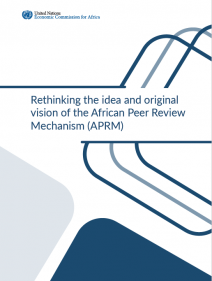The African Peer Review Mechanism (APRM) Idea refers to a set of core principles on which to frame the architecture of democracy, development, peace, and security in Africa. Within the limitations inherent in analysing the multiple meanings of ideas and their role in guiding human action, this paper approaches APRM as a driver of African political and social consciousness to guide not only the understanding of the existential world, both within and outside Africa, but also the stipulation of conditions for improving or changing existential forms by designing the governance structures, institutions and processes needed to do so. In this sense, the principles defining the APRM Idea also constitute standards for determining whether there are gaps between the workings of governance institutions and processes, on the one hand, and the principles that informed their adoption, on the other. By looking at trends in how APRM institutions and processes have operated since the Mechanism was established in 2003, the paper identifies gaps that need to be bridged between the APRM Idea and its existential forms. It concludes that those gaps should be bridged not by theorizing or conceiving another APRM Idea, but by revitalizing, reinvigorating and renewing national and continental APRM structures and processes to ensure they remain consistent with the APRM Idea and its core principles.
Share this:
Release Date:
25 May, 2021
© United Nations Economic Commission for Africa

